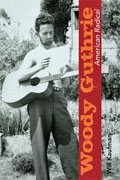Woody Guthrie, American Radical
Will Kaufman
book reviews:
· general fiction
· chick lit/romance
· sci-fi/fantasy
· graphic novels
· nonfiction
· audio books
· author interviews
· children's books @
curledupkids.com
· DVD reviews @
curledupdvd.com
newsletter
win books
buy online
links
home
for authors
& publishers
for reviewers

 |
Woody Guthrie, American Radical (Music in American Life) Will Kaufman University of Illinois Press Hardcover 304 pages March 2011 |
|
He beat himself up (verbally at least) as much as anyone beat up on him, though his family may disagree as to the balancing point, since he was known to spend long periods away from home with no explanation - or no good one. The classic if apocryphal story involves his going out to get a pack of cigarettes and not coming home for a year. He was a patriot if one looks only at the most cherished verses of his most famous song, or a communist devil and anti-American terrorist-by-music if one looks at the larger body of his considerable songwriting output. He was pro-trade-union to his core, evincing deep sympathy for the working classes. If that sympathy cannot be said to be empathy, it’s because - let's face it - he rarely worked for very long, and when he did have a respectable job once (in the US military), he bragged backhandedly that he was trying to sabotage it. And that is just one more of the many, many paradoxes in the long, fascinating, ultimately rather sad life of Woody Guthrie.
Reading outside the text, one sees Guthrie's deeply flawed personality, even as one can't help but admire his principles and his voluminous, poetic and distinctly radical writing, occasionally erotic, nearly always polemic, sometimes crude and always up the three-letter-word of the ruling class. And it was heartfelt. While attempting to compose a series of songs about the unjust trials and executions of legendary anarchists Sacco and Vanzetti, he wrote to friend Moe Asch, "I refuse to write these songs while I'm drunk and it looks like I'll be drunk a long time." During the Guthrie era, writing protest music was hardly a money-making proposition. It didn’t help that he was an alcoholic. Given that, his occasional personal whines that he needed money to feed his family ring a little hollow. One poignant incident, though, was the death by fire of his little daughter while he was out at a rally singing on behalf of the United Electrical Workers Union. Ironically, the fire in the living room of his little home was caused by cheap wiring. This gave him a greater hatred of the bosses and the “cheap synthetic imitation products made for the greedy profits of a manufacturer.” But by tortuous association, Guthrie linked Cathy Ann’s death to that of a famous protestor shot down at a worker’s rally. Perhaps even then the rigors of Huntington’s disease were snaking through his brain, hand in hand with the alcohol, to skew his priorities. Rather than dwell on the human tragedy of Guthrie’s last days and the paucity of his earthly estate, Kaufman ends the book with an examination of those who carried Guthrie’s banner and sang his songs, as well as those who - with whatever motivation - have mangled his songs to fit their own agenda. Kaufman reminds us that Woody Guthrie could be religious, was a painter as well as singer, songwriter and essayist, and did much of his guerrilla work without ego, humbly, not for gain but out of pain, and once opined to the world, “You don’t hate me any worse than I do,” a bald confession of his secret guilt. Originally published on Curled Up With A Good Book at www.curledup.com. © Barbara Bamberger Scott, 2011 |
|
|
|
 Click here to learn more about this month's sponsor! |
|
| fiction · sf/f · comic books · nonfiction · audio newsletter · free book contest · buy books online review index · links · · authors & publishers reviewers |
|
| site by ELBO Computing Resources, Inc. | |
 Author Will Kaufman has come to scientifically dissect Guthrie, not to praise him, and his viewpoint is all about the music. Himself a folksinger as well as a professor of American literature and culture at the University of Central Lancashire, England, Kaufman brings to his writing the distance of one big ocean and the admiration of one small nation. Guthrie was sufficiently lionized in Britain so that fan/faux folkster Bob Dylan was demonized by comparison; folkies under the sway of Ewan MacColl, the great Scots pontificator on all things traditional, were ordered not to imitate Bob Dylan imitating Guthrie.
Author Will Kaufman has come to scientifically dissect Guthrie, not to praise him, and his viewpoint is all about the music. Himself a folksinger as well as a professor of American literature and culture at the University of Central Lancashire, England, Kaufman brings to his writing the distance of one big ocean and the admiration of one small nation. Guthrie was sufficiently lionized in Britain so that fan/faux folkster Bob Dylan was demonized by comparison; folkies under the sway of Ewan MacColl, the great Scots pontificator on all things traditional, were ordered not to imitate Bob Dylan imitating Guthrie.